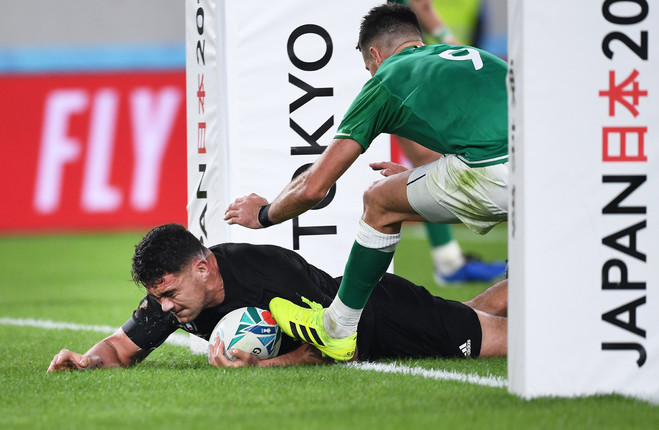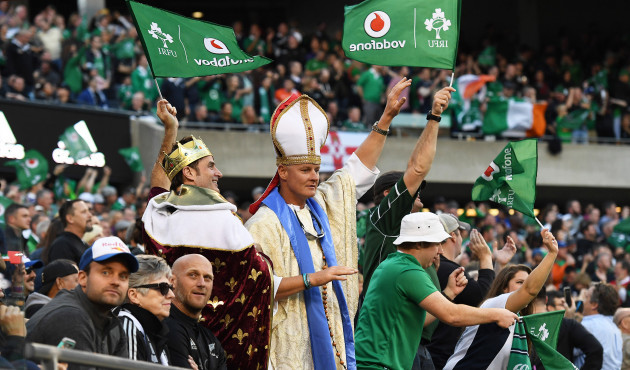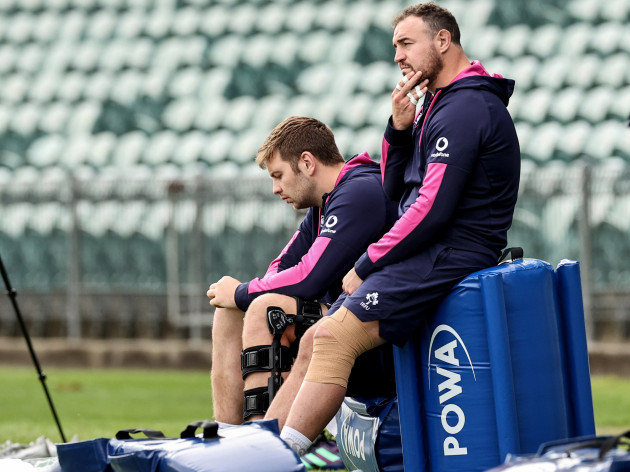FRIDAY NIGHT IN Auckland was the noisiest one of the week. From the nine-to-fivers letting the hair down to the students celebrating end of term exams, there was an intoxicating feel to the city.
That kind of giddiness can have a contagious effect and sure enough among the swelling number of Irish fans who have started to invade the bars and restaurants of this town, there is high hope history can be made (kick-off 8.05am tomorrow, live Sky Sports). Then you examine the record books and sobriety returns.
It isn’t just 28 years since the All Blacks last lost in Eden Park; it is 28 years since they last lost a series at home, France their victims that time. Before then only four sides, Australia twice, South Africa and the British and Irish Lions have managed to outdo the All Blacks on their own patch over a three-test series.
To put those figures in even blunter terms: South Africa’s solitary successful tour here was in 1937 while only one of the British and Irish Lions’ 12 series against the All Blacks ended with the tourists winning.
In this context, any Irish victory over the next three weekends should be celebrated.
Yet it seems like we have had this conversation so often with Irish teams this century, questions put to them about a 28-year gap to their previous win in Paris (2000); the respective 23-year and 49-year waits between victories over the Wallabies and Springboks; the distance from the grand slams of 1948 to 2009; the 111 year-purgatory hoping for a win over New Zealand.
Each time they got there and for sure there is a compelling case to be made that they can do so again this time. Form is with them, just one defeat coming from their last 13 games, some notable scalps along the way: England twice, Argentina with 46 points to spare, Japan by a 55-point margin, New Zealand.
Yes, New Zealand.
What once seemed impossible has more recently become the norm. Three of the last five matches between these sides have ended in Irish victories. That cannot be ignored.
But nor can the sequels. After beating the All Blacks in Chicago, Ireland suffered a bruising backlash just two weeks later at the Aviva. The fury of that New Zealand performance was then bettered at the 2019 World Cup, the first meeting between the teams since Ireland had shut the New Zealanders out 11 months earlier.
So even if the All Blacks have been on a charm offensive this week, Aaron Smith eulogising the strengths of Irish rugby and this ‘massive, massive’ rivalry that has built up, we know what’s coming. “For sure, there will be times when it will be uncomfortable out there,” said Andy Farrell, the Ireland coach. “We’ve just got to be ready for those moments and cope with them.”
Both he and his opposite number have had plenty to cope with over the course of the last seven days, COVID wiping out seven of the All Black coaching and playing staff – among them Foster – COVID and injuries removing Mack Hansen, Iain Henderson, Rob Herring and Jeremy Loughman from Ireland’s wing, lock, hooker and loosehead options – departments that had already been hit by personnel shortages.
It means the Irish bench selected this evening is the weakest one we’ve seen in a long time for a game of this magnitude, certainly a lot weaker than the one that proved to be so effective last November, when a 49-point thriller went right down to the wire.
The All Blacks have reacted to that loss by changing strategy this time. They’ve gone for power, the selection of lock Scott Barrett at blindside flanker an acknowledgement that they’re concerned about the quality of the Irish line-out. Young Dan Sheehan – ‘so young I wasn’t born the last time New Zealand lost in Eden Park’ – will be pressurised like never before at the lineout.
That isn’t the only reason Barrett is in there. “Apart from his set-piece acumen, he’s bringing a bruising defence and ball carrying – he’s probably our most dynamic lock so we can utilise that a bit at six,” explained Foster. “He finds the roles similar apart from a couple of defensive tweaks which we’ve had to make sure we tidy up.”
It is a risk because the one time Barrett played in this role before, against England in the 2019 World Cup semi-final, it ended disastrously. The logic this time is that if goes well and New Zealand bully Ireland physically, the way France did for large periods of this year’s Six Nations game, then they can seal the deal late on when Dalton Papalii, the Blues captain, and giant Fijian, Pita Gus Sowakula, come off the bench.
But what happens if Barrett’s lack of speed gets exposed at the breakdown, if Josh van der Flier, Caelan Doris and Peter O’Mahony are able to dictate those terms? How long will it be until Foster calls his man ashore? “There may be a few teething issues,” he conceded, “but we’ve put a lot of faith in Scott and the work he has done.”
He has also put a lot of thought into how Ireland can be beaten. Videos of 2019 must have been watched, not just the quarter-final horror show from Tokyo but also that year’s meltdowns against England. Sometimes, when you strip strategy away, rugby can be remarkably simple, whereby the side that wins the majority of collisions invariably wins games.
“There were a lot of lessons from our defeats to France and Ireland last year,” said Barrett. “We didn’t win the first 20 minutes, particularly the physicality. The Irish get a lot of momentum and confidence from their lineout so if we can put them under pressure there that can stop a lot of their game. That is something that excites me.”
Irish excitement is based on a few things. While there has been concern surrounding Tadhg Furlong’s scrummaging recently, the reality is that he, Ronan Kelleher and Andrew Porter won this particular battle hands down last November. Here in Auckland, the only worrying noises about a front row have come from New Zealanders who question loosehead George Bower and tighthead Ofa Tuungafasi’s technique.
There are also worries about how wings, Sevu Reece and Leicester Fainga’anuku, will cope with the aerial bombs that’ll descend from the Auckland skies and a quiet acknowledgement that there is a steadiness to Ireland’s camp these days.
Twelve of the starting XV play for the one club and while five of them only made their debut post the 2019 World Cup, there’s also an awareness that this is one of the most experienced and settled international sides to arrive here in some time.
Can Ireland do it then and make history? The answer unquestionably is yes. These two sides are among the top five in the world and in this company, any team who has an off day – as New Zealand did last November – will be punished.
Ireland are no longer a soft touch. You sense there won’t be much more than a score between this pair at the end but New Zealand’s additional power makes us shade with them to finish up on the right side of things.
Ireland team
15. Hugo Keenan (Leinster/UCD) 20 caps
14. Keith Earls (Munster/Young Munster) 96 caps
13. Garry Ringrose (Leinster/UCD) 42 caps
12. Robbie Henshaw (Leinster/Buccaneers) 57 caps
11. James Lowe (Leinster) 12 caps
10. Johnny Sexton (Leinster/St Mary’s College) 105 caps CAPTAIN
9. Jamison Gibson Park (Leinster) 17 caps
1. Andrew Porter (Leinster/UCD) 43 caps
2. Dan Sheehan (Leinster/Lansdowne) 7 caps
3. Tadhg Furlong (Leinster/Clontarf) 57 caps
4. Tadhg Beirne (Munster/Lansdowne) 30 caps
5. James Ryan (Leinster/UCD) 43 caps
6. Peter O’Mahony (Munster/Cork Constitution) 84 caps
7. Josh van der Flier (Leinster/UCD) 40 caps
8. Caelan Doris (Leinster/St Mary’s College) 17 caps
Replacements
16. Dave Heffernan (Connacht/Buccaneers) 6 caps
17. Finlay Bealham (Connacht/Buccaneers) 23 caps
18. Cian Healy (Leinster/Clontarf) 116 caps
19. Kieran Treadwell (Ulster/Ballymena) 5 caps
20. Jack Conan (Leinster/Old Belvedere) 27 caps
21. Conor Murray (Munster/Garryowen) 96 caps
22. Joey Carbery (Munster/Clontarf) 32 caps
23. Bundee Aki (Connacht/Galwegians) 37 caps
All Blacks side to face Ireland:
1 George Bower (11)
2 Codie Taylor (66)
3 Ofa Tu’ungafasi (44)
4 Brodie Retallick (92)
5 Samuel Whitelock (132)
6 Scott Barrett (48)
7 Sam Cane (77) – captain
8 Ardie Savea (59)
9 Aaron Smith (102)
10 Beauden Barrett (101)
11 Leicester Fainga’anuku* (0)
12 Quinn Tupaea (7)
13 Rieko Ioane (47)
14 Sevu Reece (17)
15 Jordie Barrett (36)
Replacements
16 Samisoni Taukei’aho (9)
17 Karl Tu’inukuafe (25)
18 Angus Ta’avao (20)
19 Pita Gus Sowakula (0)*
20 Dalton Papalii (12)
21 Finlay Christie (5)
22 Richie Mo’unga (32)
23 Braydon Ennor (4)
Get instant updates on your province on The42 app. With Laya Healthcare, official health and wellbeing partner to Leinster, Munster and Connacht Rugby.



